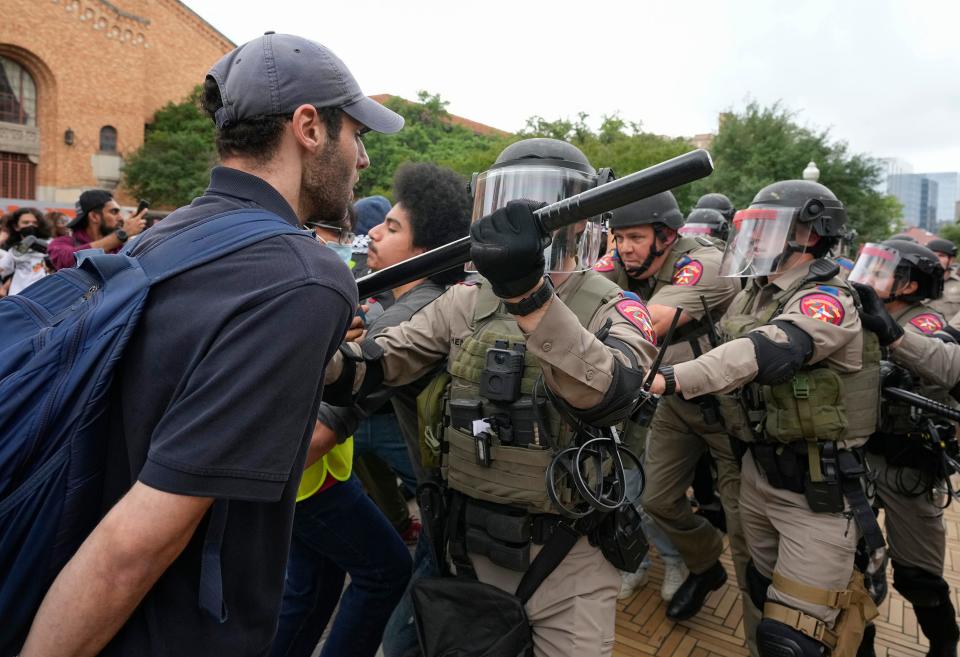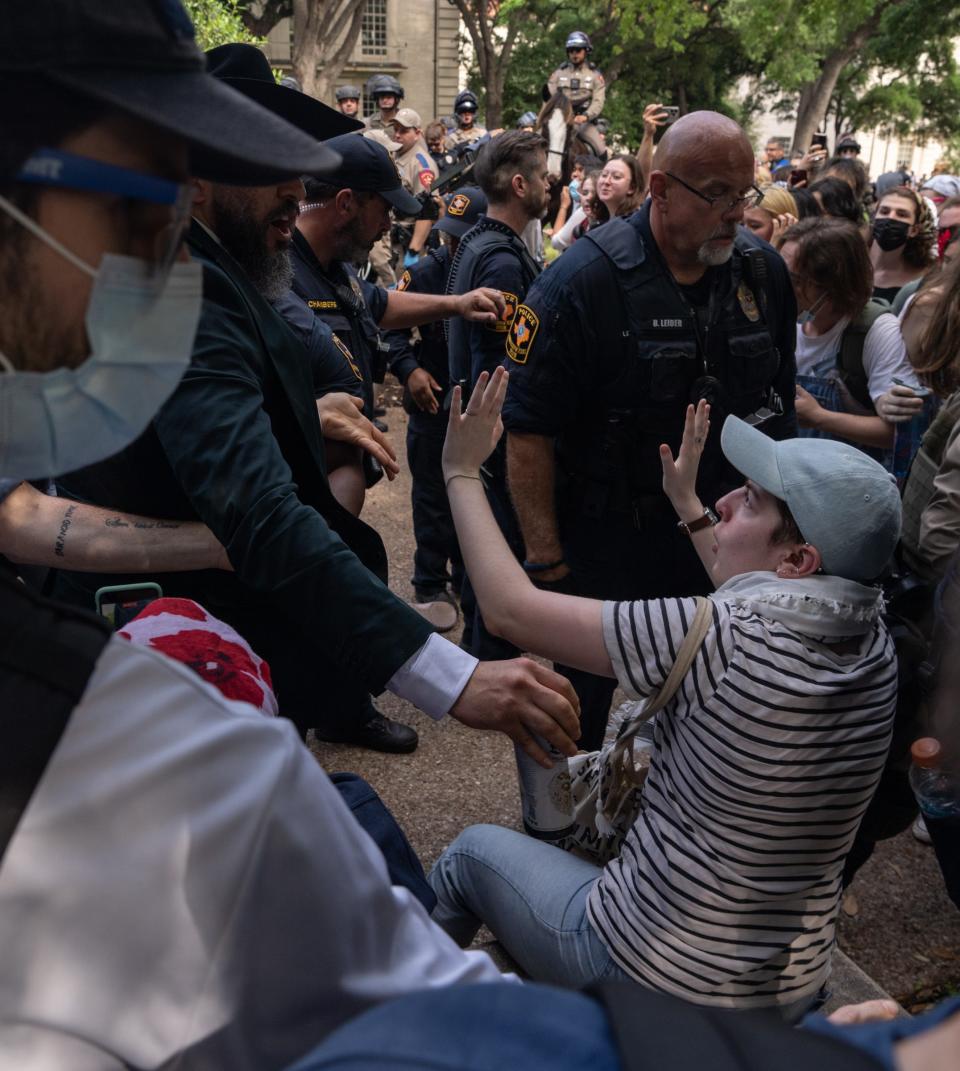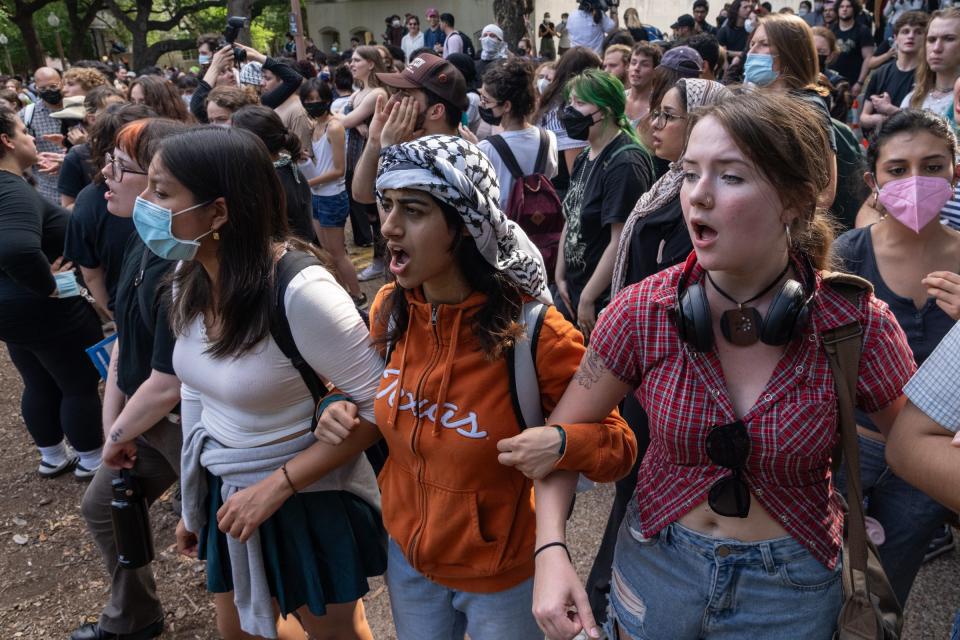Troopers shutting down UT protest wasn't the show of strength Gov. Abbott thinks | Grumet
An unspoken confidence animates healthy democracies. It’s a confidence that allows contrarian and even awful ideas to be expressed because people have faith that worthier views can withstand the challenge of weaker ones. The best will prevail in the marketplace of ideas.

You could almost hear those values get crunched underfoot Wednesday, though, as rows of state troopers marched through the University of Texas, equipped with helmets, riot shields and batons, intimidating hundreds of unarmed, pro-Palestinian demonstrators and arresting more than 50 of them.
“These protesters belong in jail,” Gov. Greg Abbott declared on social media. The only justification offered: “Antisemitism will not be tolerated in Texas. Period.”
UT later explained that it had previously forbidden protesters with the Palestine Solidarity Committee, a registered student group, from gathering that day, as it appeared their intent was to “occupy” the campus, as activists have done at other college campuses around the country.
Fair enough. If people attempting to camp is the concern, address that problem. Dismantle any tents. Enforce a curfew in that space.
Instead, we saw armed officers pushing nonviolent protesters, tackling some to the ground, for simply gathering in the middle of the afternoon in the outdoor common areas where free speech is typically allowed. Mounted police shouted the “horses will hurt you!” as they pushed the crowd off campus, with some people spilling into busy Guadalupe Street.

And even after the county attorney's office and a judge agreed to dismiss all of the trespassing charges that were plainly unjustified, it remains unclear whether UT will take disciplinary action against any students. Abbott stated on social media that students involved in these protests "should be expelled."
This muscular response is not the show of strength that Abbott thinks it is. It is a sign of political fragility in Texas when our government can’t stand to hear what certain people might say.
I recognize that tensions have been running high on college campuses since the Israel-Hamas war erupted in October. The atrocities happening half a world away feel raw and existential, especially for those with ties to Israel or the Palestinian community. Safety for one group of people seems to some to be bound up in expelling another group of people — making the difference between free speech and hate speech a matter of nuance.

People can oppose a war or decry the Israeli army’s tactics without being antisemitic, but there are also bad actors. Those who spray-painted vulgar antisemitic epithets last month on the Texas Hillel Foundation's building in West Campus. Those who burned an Israeli flag in February outside a restaurant where Jewish fraternity members were dining.
And, conversely, those who verbally harassed pro-Palestinian students gathered at an Oct. 12 meeting on campus held by the Palestine Solidarity Committee. As my colleague Lily Kepner reported then, a video posted online shortly after the incident showed a man saying he would be “in Israel killing Arabs.”
UT faces a difficult and essential job in keeping the community safe for everyone. Crucially, the university must distinguish between protected speech and actions that threaten others.
Yet at a time when we need the capacity to have difficult conversations, Abbott and Texas GOP lawmakers have championed policies that minimize the voices they dislike. Chilling the conversations about race in university classes by limiting discussion of critical race theory. Dismantling the diversity, equity and inclusion offices at universities where minority students found support, prompting UT to lay off dozens of staffers who helped students. And on the K-12 level, passing a book ban that overwhelmingly ensnares LGBTQ+ authors and themes.
When the state uses the force of law to shun certain speech, we shouldn’t be surprised when they use Department of Public Safety troopers in riot gear to silence an entire crowd.
But we should be alarmed.
At its core, the First Amendment protects the right to dissent. After all, it’s not the speech and rallies the government already likes that need protecting. It’s the unpopular utterances, the rallies that officials would rather not see, the airing of grievances the government would rather not hear. Those things are important enough in a democracy that they get the first protections offered in the Bill of Rights.
Surely UT and the governor know that.
On Thursday, hundreds of protesters returned to the UT campus, not only to criticize Israel's bombardment of Gaza, which has reportedly killed more than 30,000 people, but also to call out the police and officials who shut down Wednesday’s protest.
A small contingent of campus police stood off to the side as protesters spoke freely, chanted enthusiastically, then scattered peacefully.
It was, for UT, an exhibition of true strength.
Grumet is the Statesman’s Metro columnist. Her column, ATX in Context, contains her opinions. Share yours via email at bgrumet@statesman.com or on X at @bgrumet. Find her previous work at statesman.com/opinion/columns.
This article originally appeared on Austin American-Statesman: Grumet: Troopers shutting down UT protest wasn't a show of strength
